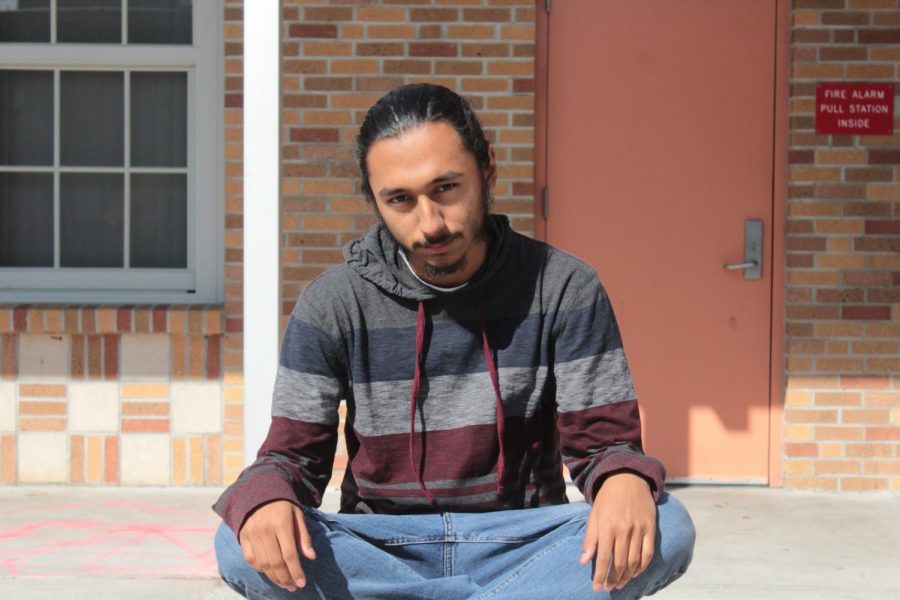Scorpio: The storyteller, the story
Five people in the crowd have their hands raised.
Two years ago, senior Isak Belmarez would be unaffected – but now, as he stands on stage as a part of the Heard ‘Em Say teen poetry slam, these five randomly selected people will determine how far he takes his newfound craft.
“My journey to poetry is a strange one,” Belmarez said. “My family is full of art and writing, but as far as slam, I never really knew about it – one day I just kind of started looking for it.”
Belmarez found his passion for slam poetry two years ago when he first became involved in the Heard ‘Em Say program, a three-month series of writing workshops, performances and qualifying rounds engineered to guide teenage writers on their paths as slam poets every year.
“It’s really just a big family, and if writing and performing is something you like to do, you very much find your tribe right there,” Belmarez said. “It’s pushed me outside of my comfort zone, being able to put my real emotions on the page and then being able to actually say these things and stand by them…and not be ashamed of it.”
Beyond instilling a love of the craft, Heard ‘Em Say also contains a major competitive element: those who stay in the top six scoring poets by the end of the three-month session will be given the opportunity to join the youth poetry team. Additionally, these chosen few will represent Tampa in the international Brave New Voices competition held at Houston, TX.
“It’s not a goal – it’s in the future,” Belmarez said. “I plan to make the team; my goal right now for this year, at this current moment, is for me to be able to make the regional Misfit Team and the Heard ‘Em Say Team.”
To do so, Belmarez will have to score well in the final Grand Slam – and the five judges will change depending on the night and the crowd in attendance. When it’s his turn to perform, and as a part of the Tampa Bay poetry community, Belmarez dons another name: Scorpio.
“Scorpio is my middle name,” Belmarez said. “I kind of had an identity crisis around freshman-sophomore year, just realizing [that]… I’ve went through a complete change. I’ve always gone by Scorpio when I’m around people who do music, people who do art and when I stepped to the poetry community, I made the decision: ‘They’re all going to call me Scorpio.'”
As a writer, Belmarez’s signature in his poetry is his crafting of the conceptually abstract, capturing grim realities in “quirky” packages. One of his pieces is entitled “Where’s Waldo?” and details existential crisis.
“My favorite types of poems aren’t genre based, they’re more about concepts,” Belmarez said. “I like people who build a world and paint a picture and really let you in on the insight to their life.”
Supplementing his poetry, Belmarez also enjoys doing video work and was given a media pass to cover the Gasparilla Music festival. His plan for the future includes maximizing all his creative outlets and pursuing a life in the realm of the arts.
“Through Heard ‘Em Say I’ve gotten introduced to a lot of nationally renowned poets – Grim Jackson, Ebony Stewart,” Belmarez said. ” I’ve gotten the chance to hang out and talk with them, and since I’m able to meet them face to face as a person first, in my mind right now, poetry is the most tangible creative career path.”
As a competitor, one of the greatest struggles he faces is overcoming the difference between good poetry pieces and good slam pieces.
Judges are only able to hear a poem once before scoring, which often results in more concrete and explicitly written poetry earning more points. Belmarez says he aspires to get rid of this difference, promoting writing that is more conceptually oriented and developed in its expression of ideas – a “Poetic Revolution” of sorts.
“There’s an interesting misconception about poetry: that we’re all these insanely creative thinkers that think outside the box,” Belmarez said. “Really, you step outside your normal box, into poetry, to step into another box. What really separates the heavy-hitters…. [is being able to] get outside of that box.”
When writing, Belmarez uses his poetry to reflect on his past experiences, employing it both as an art form and a coping mechanism to grow from.
“The biggest thing poetry has done for me… is awareness,” Belmarez said. “I was already a very aware person, but I was aware of the world around me – poetry made me aware of myself.”
Belmarez will be taking his slam poems to the Inkwell Center on March 30 to participate in the Grand Slam – and potentially solidify his position in the top six.

